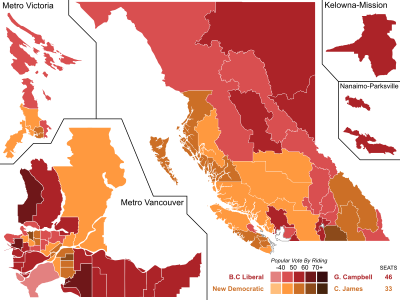| |||||||||||||||||||||||||||||||||||||||||||||||||
79 seats of the Legislative Assembly of British Columbia 40 seats were needed for a majority | |||||||||||||||||||||||||||||||||||||||||||||||||
|---|---|---|---|---|---|---|---|---|---|---|---|---|---|---|---|---|---|---|---|---|---|---|---|---|---|---|---|---|---|---|---|---|---|---|---|---|---|---|---|---|---|---|---|---|---|---|---|---|---|
| Turnout | 57.80%[1] | ||||||||||||||||||||||||||||||||||||||||||||||||
| |||||||||||||||||||||||||||||||||||||||||||||||||
 Popular vote map by riding. Traditional areas of NDP support returned to the party fold after the preceding wipeout. | |||||||||||||||||||||||||||||||||||||||||||||||||
| |||||||||||||||||||||||||||||||||||||||||||||||||
The 2005 British Columbia general election was held on May 17, 2005, to elect members of the Legislative Assembly (MLAs) of the Province of British Columbia (BC), Canada. The British Columbia Liberal Party (BC Liberals) formed the government of the province prior to this general election under the leadership of Premier Gordon Campbell. The main opposition was the British Columbia New Democratic Party (BC NDP), whose electoral representation was reduced to two MLAs in the previous provincial election in 2001.
The BC Liberals retained power, with a reduced majority of 46 out of 79 seats, down from the record 77 out of 79 in 2001. While the popularity of Campbell's government was affected by various factors such as its resolution of the Fast ferry scandal inherited from the previous NDP government, the sale of BC Rail, and Campbell being convicted for driving under the influence in January 2003, the overwhelming majority they earned at the previous election held up well enough for them to remain comfortably in control of the Legislative Assembly. Voter turnout was 58.2 per cent.
Under amendments to the BC Constitution Act passed in 2001, BC elections are now held on fixed dates: the second Tuesday in May every four years. This was the first provincial election for which elector data in the provincial elector list was synchronised with the National Register of Electors.[2]
Coincidental with the general election, BC voters also voted on whether or not to change the province's electoral system.
- ^ "Statement of Votes - 38th Provincial General Election" (PDF). Elections BC. Archived (PDF) from the original on September 25, 2023. Retrieved September 25, 2023.
- ^ "Elections BC and Elections Canada will Amalgamate Voters Lists" (PDF). Victoria, British Columbia: Elections British Columbia. May 21, 2004. Retrieved March 30, 2011.


